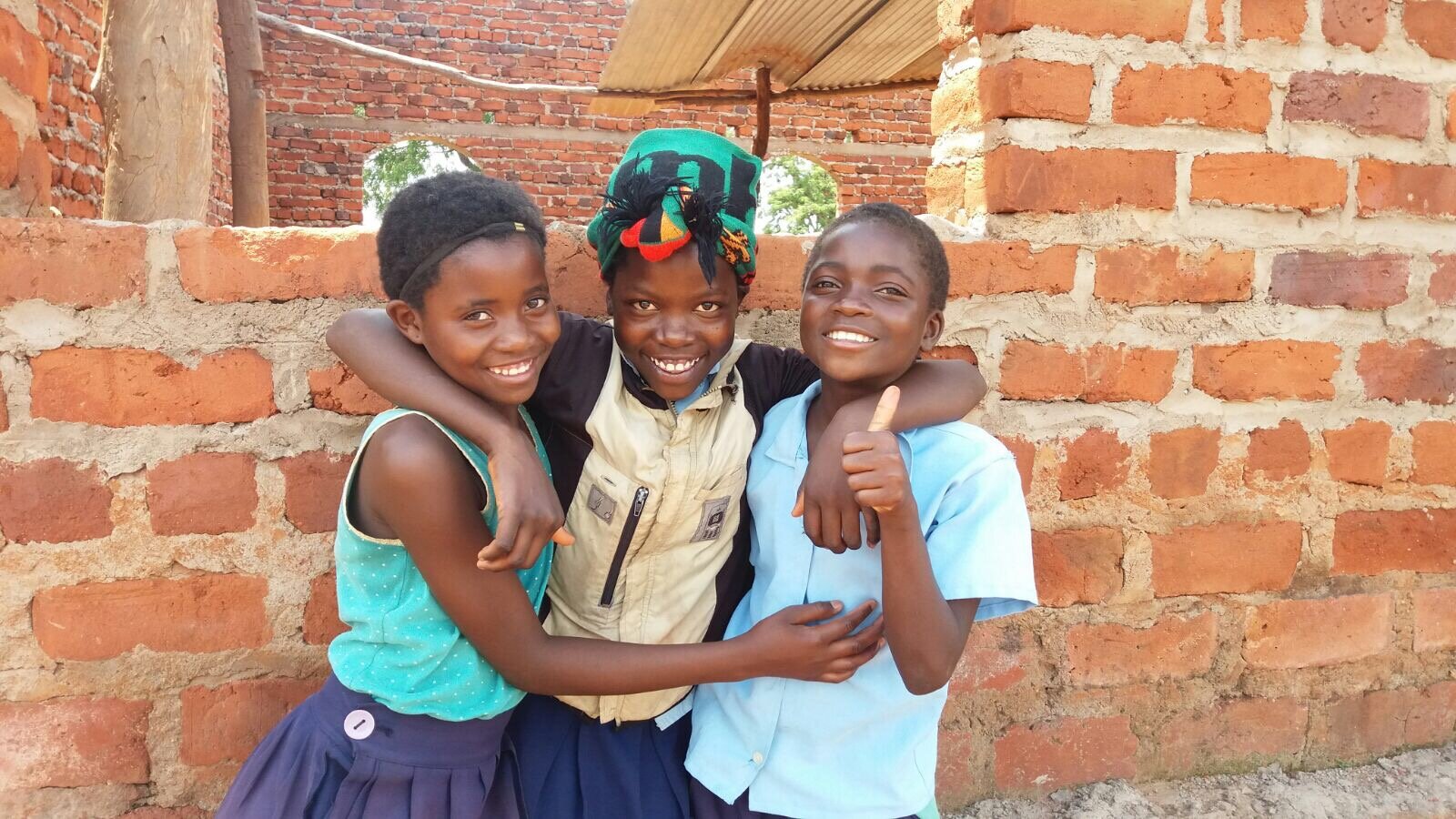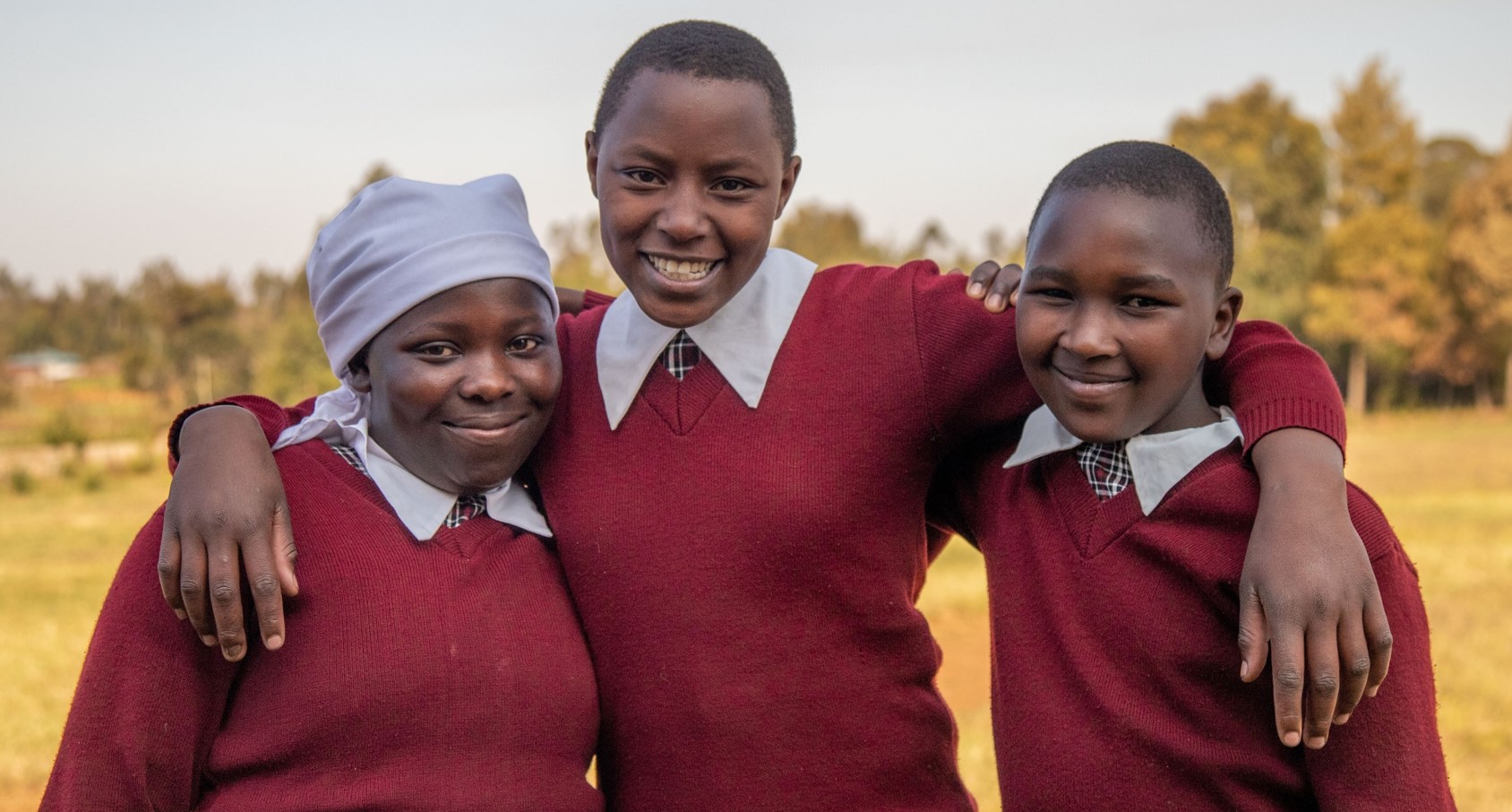
About the Together Women Rise Grants Program
Together Women Rise’s Grants Program has two key components that support our overall mission to achieve global gender equality. Featured Grants are largely focused on delivering direct services by funding grassroots organizations that empower and support women and girls in low-income and marginalized communities in the Global South. Our Transformation Partnerships are designed to invest in areas where we can make the biggest impact on achieving global gender equality by addressing the root causes of gender inequality.
Through our Featured Grants Program, we highlight a different organization/project each month, providing a variety of learning materials on the issue and how the grant will be used.
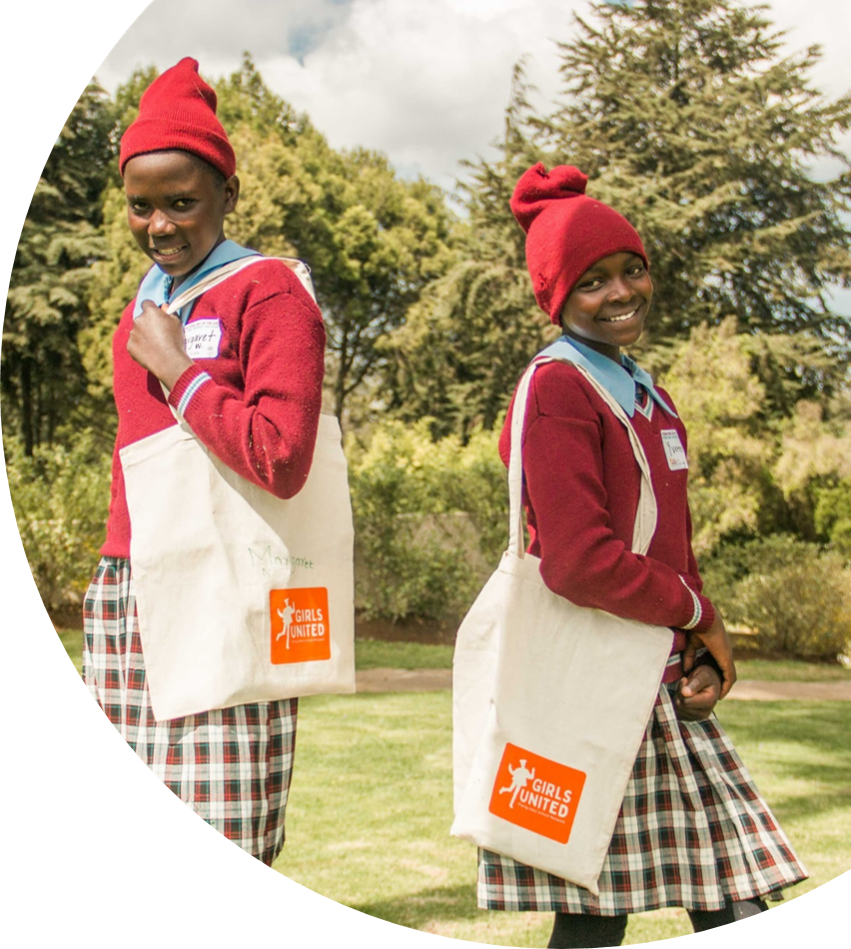 Featured Grants may include:
Featured Grants may include:
- Project grants to fund a specific project or a particular deliverable for a specific timeframe; or
- General Operations grants to cover an organization’s day-to-day, ongoing expenses, such as salaries, utilities, office supplies, and more; or
Capacity-building grants to strengthen an organization’s systems and thereby increase its effectiveness.
The Global Issue
Breaking Down Barriers to Girls’ Education
Our focus on girls’ education continues this month, with a special emphasis on breaking down the barriers that keep girls from formal schooling, especially sexual and reproductive health (SRH) education. When girls gain an education, they can open the door to a brighter future – helping themselves as well as their families, communities, countries, and beyond. Yet worldwide 129 million girls are out of school. Girls experience many barriers to accessing and completing their education, including:
- Economic conditions/poverty — Even when there are no school fees, parents are often unable to afford the cost of transportation, books, and uniforms.
- Gender bias and stereotyping — Girls are often forced to stay at home to handle household chores or care for younger siblings, and in the classroom, girls’ interests and ambitions are seen as inferior to boys.
- Early marriage – Girls who marry under the age of 18 are more likely to drop out of school.
- Threat of violence – Every year, approximately 60 million girls are sexually assaulted at school or on their way to school, leading many of them to drop out.
- Conflict and crisis – In areas of conflict and crisis, girls are twice as likely to be out of school than girls in unaffected countries.
Sexual and Reproductive Health Education
In addition to the barriers listed above, periods are causing girls to be absent from school globally. Menstruating girls face particular stigmatization and shame, often causing them to drop out of school altogether when they begin menstruating or stay home during their periods. Globally, girls often lack menstrual hygiene supplies and the knowledge to care for their own menstrual health. No supplies, no sanitary facilities, and no understanding of what is happening to their bodies compounds the challenges of being a girl that is seen as “less than” her male counterparts.
Consider these facts from a 2024 report by UNICEF and the World Health Organization on WASH (Water, Sanitation, and Hygiene):
- Worldwide, only 39 percent of schools provide menstrual health education. (This is more likely in secondary schools.)
- Less than 1 in 3 schools globally have garbage bins for menstrual waste in girls’ restrooms – this decreases to 1 in 5 schools in the least developed countries and only 1 in 10 schools in sub-Saharan Africa.
- In sub-Saharan Africa, for example, only 1 in 8 schools provide menstrual products for free or for purchase. They simply are not readily available for many school-age girls.
- In many countries, adolescent schoolgirls do not have access to a clean toilet or other dedicated private space to change menstrual products in school. Many lack access to soap and water.
- Stigma remains such a crucial factor in SRH – millions of girls are unaware or unprepared for menstruation before their first period. Girls often feel ashamed or unable to openly discuss the topic. This shame can affect their mental health and school attendance.
Knowledge, support, and practical help can remove barriers and keep girls in school. And that changes the future for them, their families, and their communities.
| Taxing menstrual products – known as “the tampon tax” – economically prejudices women. In the United States, state sales taxes vary widely, but as of May 2024, 20 states (and many cities and counties) tax period products. |
About Our Grantee
This month, Together Women Rise is funding two, $50,000 project grants to Flying Kites and Impact Network International.
Flying Kites
Flying Kites believes education is a path out of poverty. In partnership with resource-poor primary schools in rural Kenya, the organization is transforming primary education by investing in girls, upskilling teachers, and supporting healthy schools.
Adolescent girls served by Flying Kites are uniquely vulnerable. They live in underserved rural areas and have limited access to age-appropriate resources on menstrual health management (MHM), sexual and reproductive health (SRH), and gender-based violence (GBV) prevention.
Three key elements underpin Flying Kites’ approach to keeping girls in school: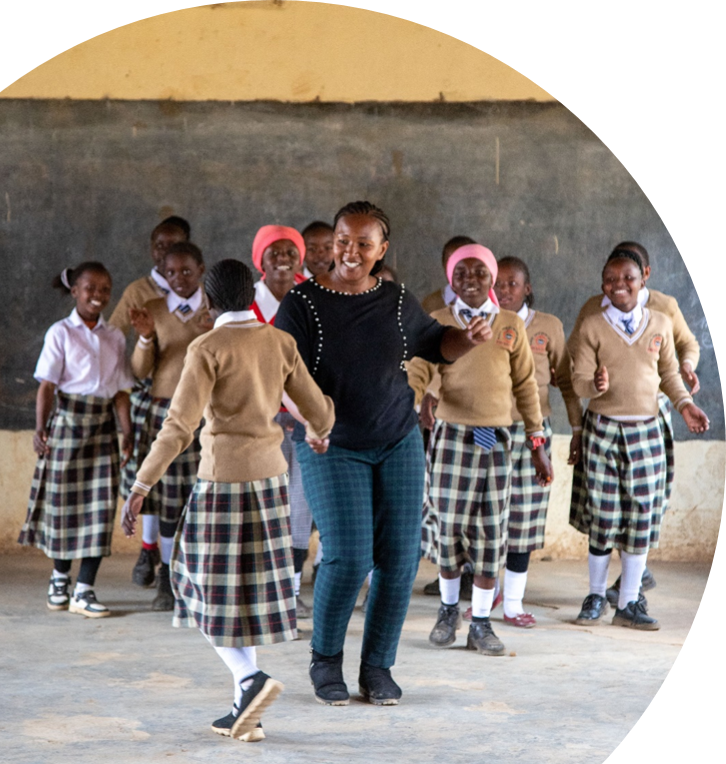
- Investing in girls as agents of change in the community via school-based Girls United (GU) Clubs.
- Building the capacity of teachers to enhance student learning in their classrooms through their Teacher Training Center, especially through learning about basic technology and online resources. A UNESCO report on Technology in Education cited the Teacher Training Center as an example of how harnessing the power of technology can help educators unlock their potential and transform their classrooms.
- Supporting healthy schools by addressing critical barriers to learning, such as lack of access to basic resources, by launching School Meals Programs and investing in Water, Sanitation, and Hygiene (WASH) infrastructure. Removing hunger as a barrier, Flying Kites served nearly a million school meals across its School Network in 2023 and a new co-op farm is supplying fresh produce to schools.
LEARN MORE ABOUT FLYING KITES
Life Challenges of the Women Served
Kenya
Women and adolescent girls are the most vulnerable people in Kenya, especially those in rural areas. From insufficient financial resources to harmful cultural norms, many Kenyan women live with constant fear, uncertainty, and worse. Children are particularly at risk.
Deep-rooted patriarchal society – Kenyan women are trapped by societal norms etched in gender inequality. They are harassed and expected to be submissive and obedient, while men are expected to control and dominate women both in and outside the home. Significant inequalities exist between men and women in education, health outcomes, governmental representation, and participation in the labor market.
Poverty – Kenyan women are caught in a cycle of poverty. It not only affects them, but also the children and elderly family members in their care. Women often do unpaid childcare and domestic work, which constrains their mobility and limits their access to economic resources.
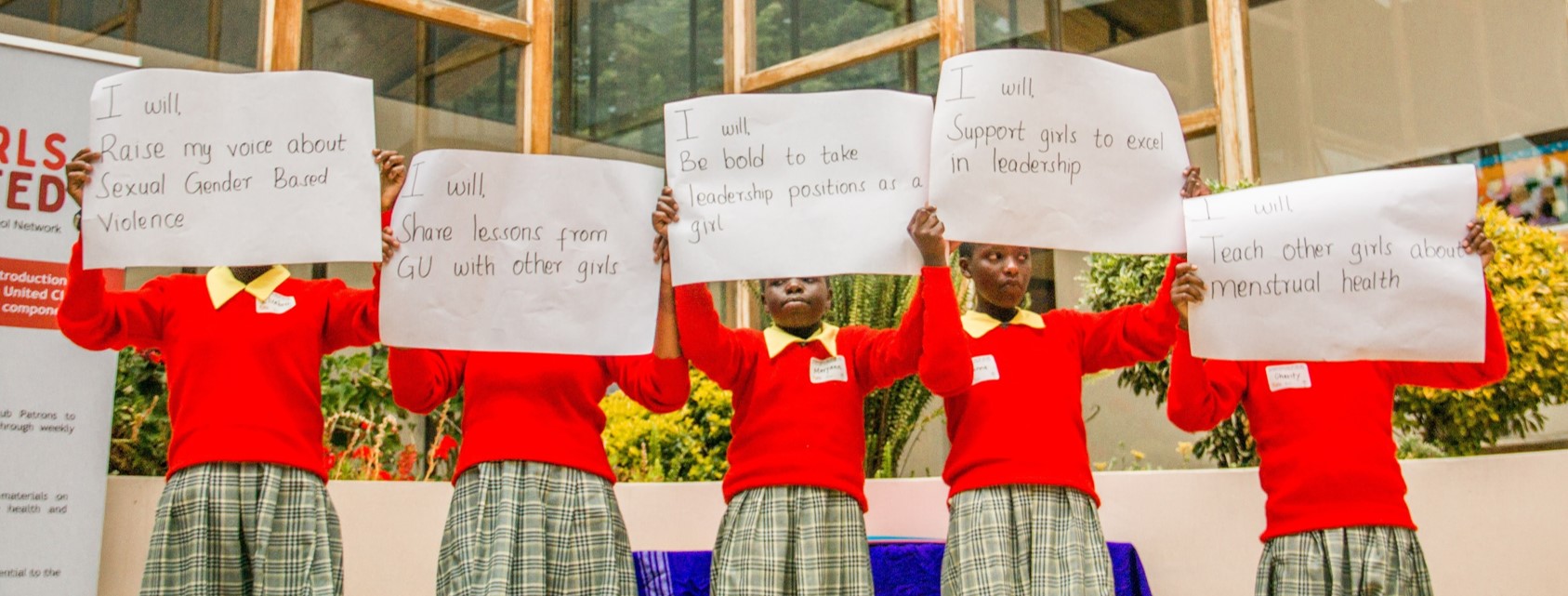
Lack of education – Access to education for Kenyan girls has improved, but obstacles and local norms continue to undermine the value of education for girls. Half of the girls in Kenya will not complete secondary school. Early pregnancy is the primary driver for girls dropping out of school following the pandemic.
Early marriage – Across Kenya, 4.2 million girls are married before age 18 and 49 percent of adolescent girls report experiencing physical violence, including 11 percent reporting sexual violence.
Ill-timed SRH education – Despite evidence that SRH interventions are effective when delivered to very young adolescents (ages 10 – 14), most SRH programs are designed and delivered to girls in secondary school.
Misconceptions about menstruation – This is a widespread problem because menstruation is considered a taboo subject that is not openly discussed. This is due to gender inequality, discrimination against women, poverty, and a lack of basic hygiene services and products.
Female Genital Cutting/Mutilation (FGC/M) – One out of five women ages 15 – 49 have endured FGC/M in Kenya. This is an estimated 4 million women and girls.
Lack of adequate work and family support – This strains the family income and continues the cycle of poverty. Some Kenyan women and families rely on relatives or other informal means for support.
Harassment when looking for jobs – Kenyan women who work in the informal sector endure discrimination if they attempt to get jobs typically dominated by men.
How Our Grant Will Be Used
Together Women Rise’s $50,000 Featured Grant to Flying Kites funds the expansion of the organization’s Girls United Program to benefit 234 teachers, 5,084 students, and 17,794 family members across nine underserved public primary schools in rural Kenya.
Half of all girls in Kenya will not complete secondary school. According to Flying Kites, evidence shows that this is largely due to high instances of early pregnancy, early marriage, and gender-based violence (GBV).
In 2007, Flying Kites opened its primary school in rural Kenya to provide access to quality education and essential resources for learning. It emerged as a top-performing school in the district. In 2018, in partnership with Kenya’s Ministry of Education, Flying Kites assembled a cohort of underserved public primary schools (its “School Network”) as a framework for identifying and addressing barriers to learning in the rural community.
In 2020, following an astounding 42 percent increase in early pregnancy during pandemic-related school closures, Flying Kites collaborated with School Network teachers to deliver menstrual health resources to girls, including surveys to assess menstrual health management (MHM) and understand their needs and challenges. All 727 girls surveyed had something to say – from questions and fears about menstruation to reports of sexual assault and pregnancy. Seeing a dire need, Flying Kites returned with more resources as schools reopened in 2021 – when 65 percent of girls reported feeling “unsafe” – but it was just a start.
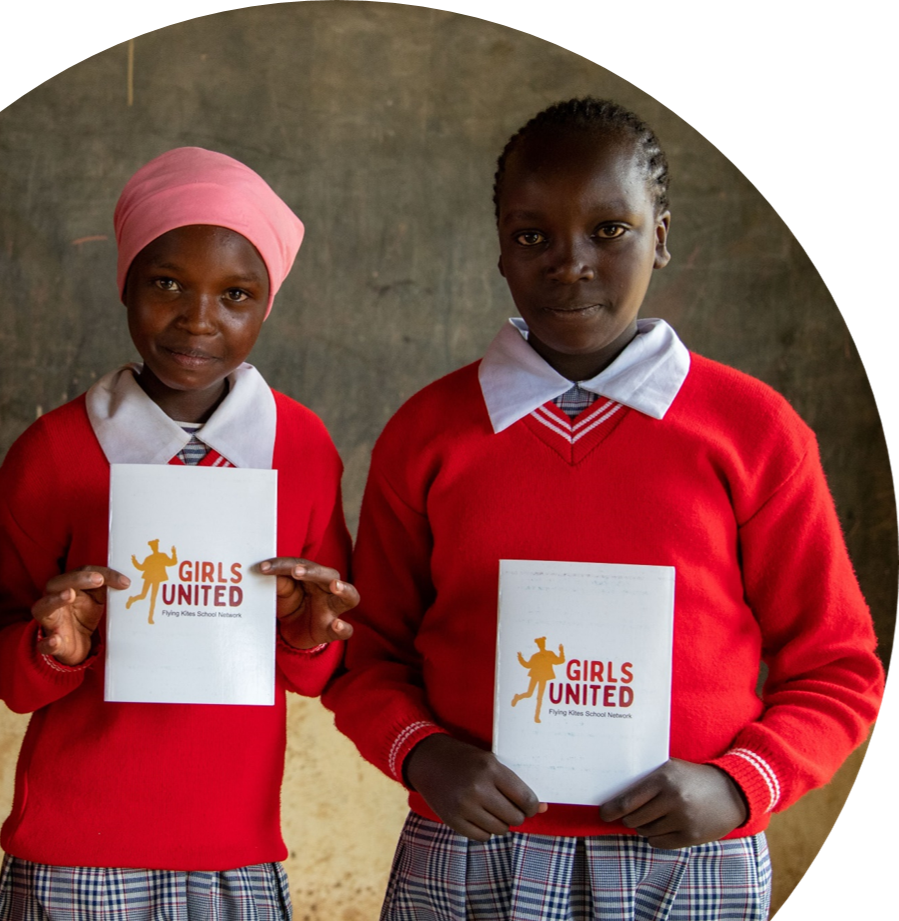 Flying Kites’ holistic Girls United (GU) Program was developed based on the voices of those 727 girls who continue to inspire, inform, and hold the organization accountable.
Flying Kites’ holistic Girls United (GU) Program was developed based on the voices of those 727 girls who continue to inspire, inform, and hold the organization accountable.
GU Clubs develop knowledge and skills in core curricular focus areas of MHM, SRH, GBV, and gender equity
Club participants have access to trained and supported female teachers as Club Leaders, sufficient period products, and access to private latrines and hand-washing facilities at school.
Participants learn about their bodily integrity and gain the confidence and skills to identify and address GBV.
Flying Kites’ Teacher Training Center and Academy serves as a community-centered resource for innovation and capacity building, serving educators across the School Network. At the Center, Flying Kites designs, pilots, and introduces locally led programs that increase gender equality, alleviate health disparities, and build the capacity of teachers.
Underpinned by Flying Kites’ unique G.I.R.L.S. framework and year-long curriculum (composed of Guidance, Information, Resources, Leadership, and Skill-building), the grant directly supports investment in 42 female teachers to launch and lead GU Clubs focused on addressing the biggest barriers to learning for 1,488 very young adolescent (VYA) girls, ages 10 – 14, in the local school network. The funding provides a strong and sustainable foundation for Flying Kites’ five-year plan to build the capacity of 963 female teachers to lead the expansion of GU Clubs across 47 public primary schools, benefiting more than 25,000 students, 1,500 teachers, and 87,500 families throughout the rural district.
The grant also supports the Stand Together initiative to equip school communities to prevent, respond to, share knowledge around, and report instances of gender-based violence. The primary school-aged girls served by Flying Kites are uniquely vulnerable, not just because they live in marginalized rural communities, but because very young adolescent girls in primary schools have limited access to age-appropriate resources on sexual and reproductive health education (SRH), menstrual health management (MHM), and gender-based violence (GBV) that are relevant to their lived experiences.
Budget
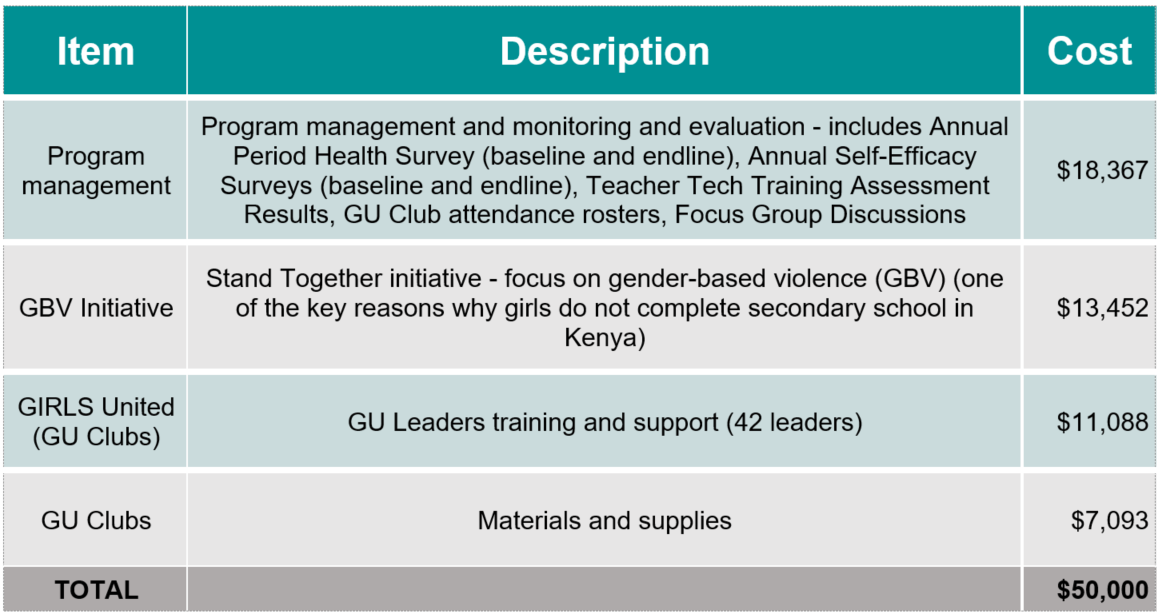
Why We Love This Project/Organization
We love this project because it focuses directly on eliminating barriers that keep girls from completing formal schooling, while also creating a culture within GIRLS United Clubs that fosters openness about taboo subjects and connection with trained, supported educators.
Impact Story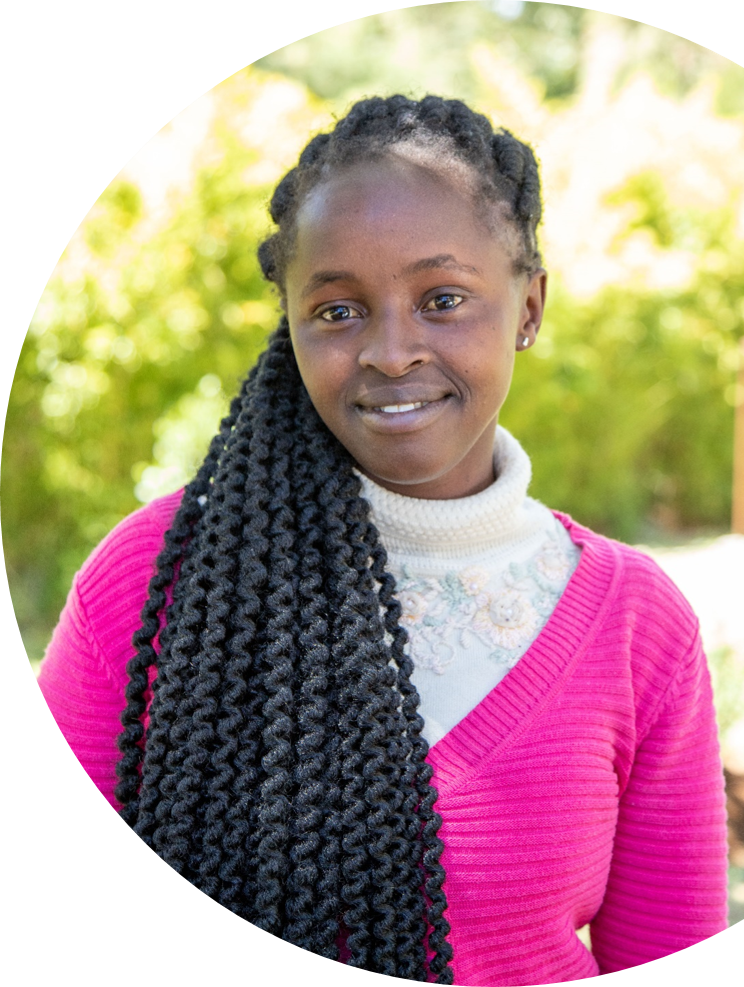
Meet Eva
Eva is from Njabini, a town situated at the foothills of the Aberdares Mountains in South Kinangop, Central Kenya. Most people in Njabini work in the smallholder farming economy as casual laborers in local farms that produce cabbage, carrots, peas, and potatoes.
Eva and her siblings grew up in this rural community and attended Chania Primary School, where their father was the Head Teacher. When Eva went through puberty, she quickly learned that many of the challenges girls face during early adolescence were seen as taboo, leaving her and her classmates without access to adults who would answer their questions about menstrual hygiene, sexual and reproductive health, and relationships.
But Eva persevered and was able to complete secondary school and college. She came back to the community where she grew up to teach Kiswahili at the primary school. In 2022, Eva joined the teaching staff at Flying Kites Academy, where she enthusiastically volunteered to serve as a Girls United Patron (club leader), establishing herself as a trusted adult for adolescent girls – becoming a role model in the community and in the classroom. She supports girls as they navigate early adolescence, approaching issues with a deep understanding of their needs and the cultural norms that exist.
With support from Together Women Rise, Flying Kites continues to train and support teachers like Eva to ensure that girls have access to the information, resources, and support they need to make informed decisions about their bodies, their education, and their future.
Impact Network International
Impact Network International believes every child deserves a quality education. INI transforms lives in rural Zambian communities through education and innovation, at a fraction of the cost of other alternatives.
INI has a strong history of promoting and supporting gender equality, having implemented a range
of initiatives and policies to advance gender equity within its educational programs and leadership structures. Its programs include:
- Impact Education, which currently includes 43 INI schools serving more than 6,000 students per year. The schools hire and support local teachers, provide supplies, and provide teachers with a tablet and projector to deliver class lessons. The tablets contain thousands of lessons and lesson plans that adhere to the Zambian national curriculum, are approved by the Ministry of Education, and are taught in the local language. Practical barriers to implementation are also removed by providing solar power and security, hiring local workers to build and maintain schools, and more.
- Impact Girls helps girls stay in school through several initiatives, including providing latrines and handwashing stations, along with menstrual pad-making workshops to create reusable supplies. The program also involves girls in NetGirls Zambia League, a sport that is a hybrid between handball and basketball. Girls in the league build teamwork and self-esteem, gain role models, and break down gender stereotypes.
LEARN MORE ABOUT IMPACT NETWORK INTERNATIONAL
Life Challenges of the Women Served
ZAMBIA
Women and girls in Zambia face a patriarchal society that often demeans women and leads to negative outcomes.
Poverty – In Zambia, more than 75 percent of the rural population survives on less than $0.64 a day. Many are subsistence farmers. Economic opportunities for women in these rural communities are scarce.
Menstruation – Zambian girls lack critical menstrual health hygiene materials and knowledge, leading to poorly managed menstrual health hygiene. This contributes to four to five missed school days each month. Zambia has shown marked improvements in making menstrual products and services available in schools, but more needs to be done.
Cultural norms – The Zambian culture is based on patriarchal, conservative values across tribes. In this system, the men have the power and make the decisions, while the women are expected to be subordinate. This goes for ownership and inheritance of assets as well.
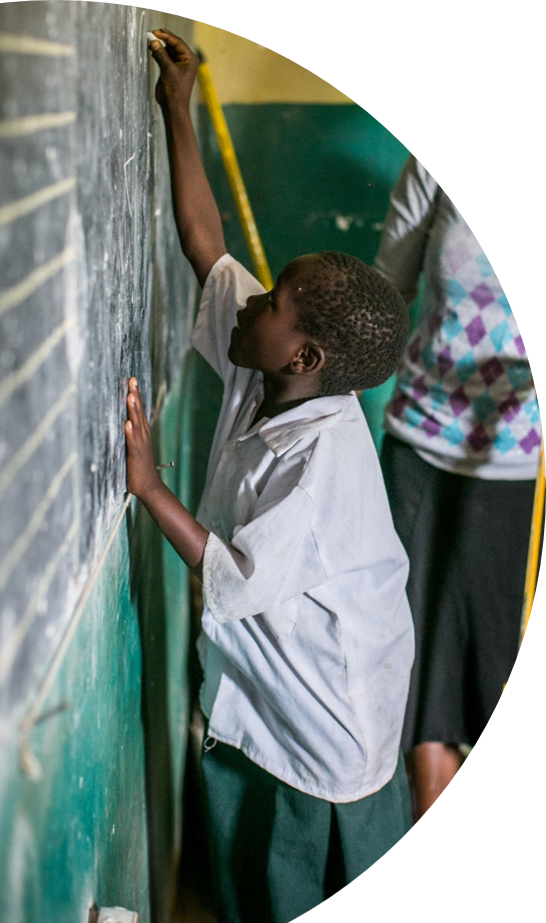 Dual legal system – Zambia’s legal system consists of both civil law and customary law. To resolve disputes, many rural Zambians use customary laws observed by their tribe. These disputes may involve access to land, inheritance, property, and marriage. Unfortunately, the customary laws can be discriminatory against women.
Dual legal system – Zambia’s legal system consists of both civil law and customary law. To resolve disputes, many rural Zambians use customary laws observed by their tribe. These disputes may involve access to land, inheritance, property, and marriage. Unfortunately, the customary laws can be discriminatory against women.
Lack of education – Less than one in three Zambian girls finish primary school and only eight percent complete secondary school. This is often due to early marriages and pregnancies, as well as a lack of access to menstrual hygiene products and facilities. Women with limited education are often excluded from business opportunities, thus keeping the cycle of poverty alive.
Low literacy – Stemming from a lack of education, low literacy makes girls and women vulnerable in many ways. This is especially true when it comes to understanding their rights and their sexual and reproductive health.
How Our Grant Will Be Used
Together Women Rise’s $50,000 Featured Grant funds the Impact Girls Program, designed to empower and uplift rural girls and young women in Zambia through an approach that addresses the critical challenges they face. Impact Girls is committed to addressing issues such as limited agency in decisions related health, as well as the scarcity of essential menstrual health hygiene materials and knowledge.
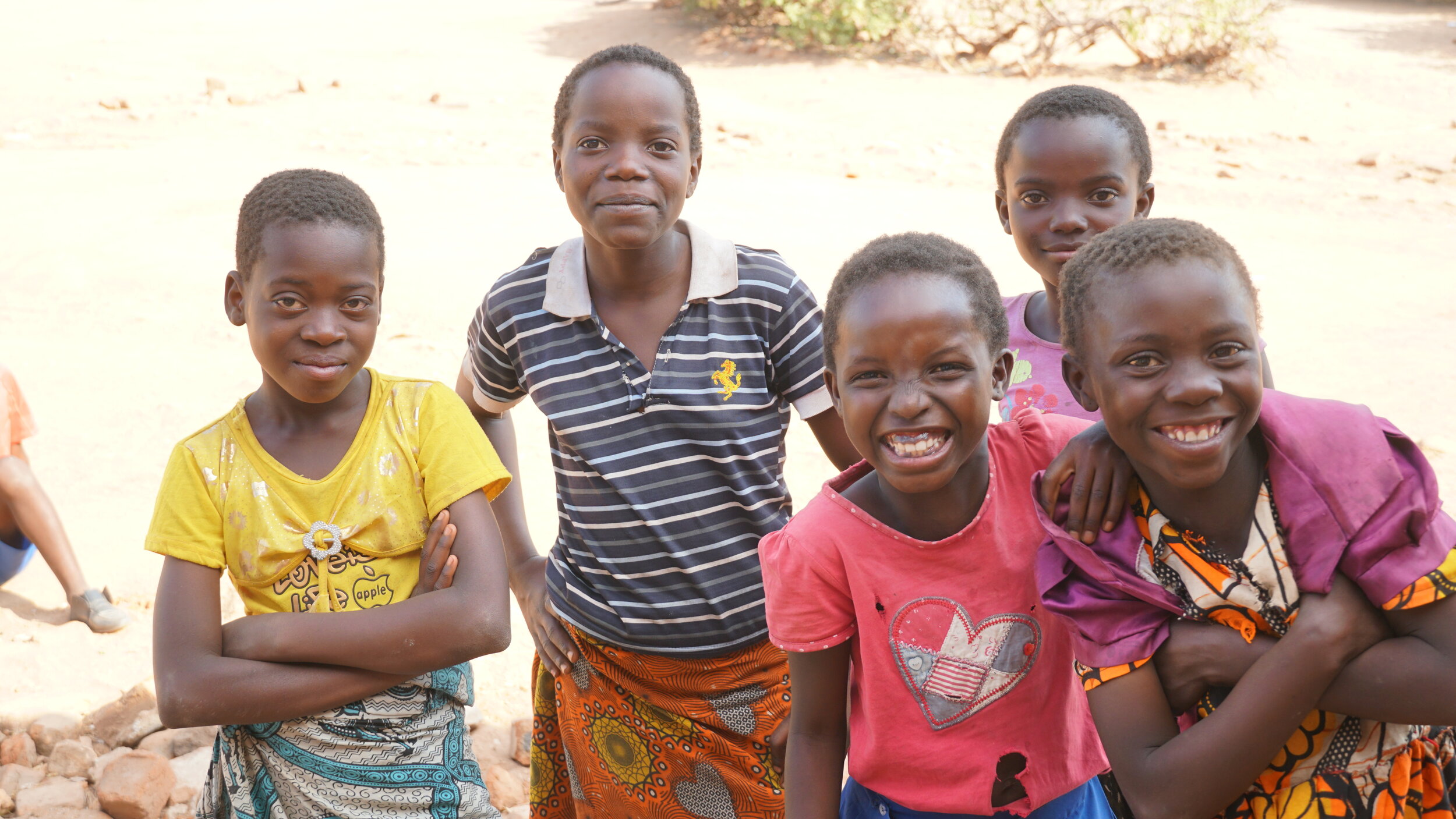
Our grant will support six key components of the Impact Girls Program, benefiting more than 3,000 girls and women in the Eastern province of Zambia:
- Menstrual Health Hygiene Workshops: Aim to destigmatize menstruation, educate girls on menstrual health and hygiene, and demonstrate how to create reusable pads
- GLOW Clubs (Girls Leading Our World): Engage upper primary girls in a 13-lesson series on female empowerment, leadership, personal and menstrual hygiene, peer pressure, self-esteem, and gender equality
- NetGirls Zambia League: Supports more than 1,000 young women in netball
- Financial Literacy for Women: Offers financial workshops to women in the community, empowering them with money management, budgeting, saving, investment, and entrepreneurship skills
- Female Mentor Program: Pilots a mentor program in which female primary school graduates tutor current female primary students during term breaks to inspire the next generation, build confidence, strengthen linkages with secondary school students, and support struggling primary students
- Supporting Women Teachers: Hires and trains five female teachers to provide job opportunities and serve as role models for female students
The Glow Clubs, Mentor Program, and Menstrual Health Workshops are conducted within INI schools. NetGirls, Financial Literacy, and the Income Generation project are designed for women and girls in the village, typically ages 15 and older who do not attend INI schools.
Budget
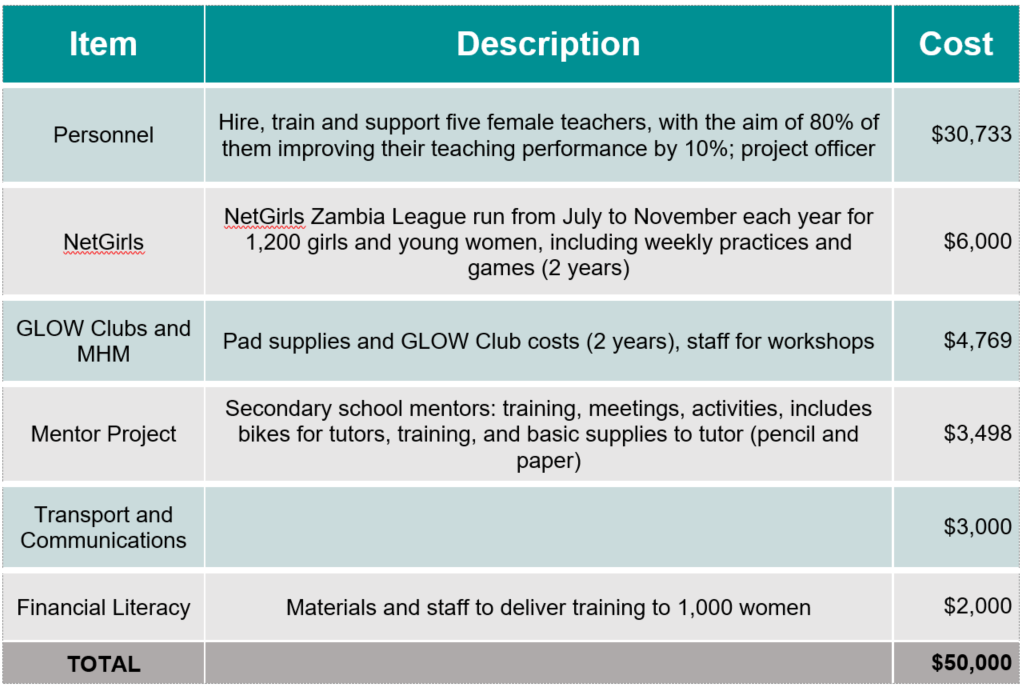
Why We Love This Project/Organization
We love this project because it is community-led and driven, with staff members than have lived experiences of what is needed to make the work succeed. Impact Girls is a holistic program that addresses the multi-layered reasons why girls leave school. Increasing agency and knowledge among adolescent will help the project perpetuate a new generation of role models.
Impact Story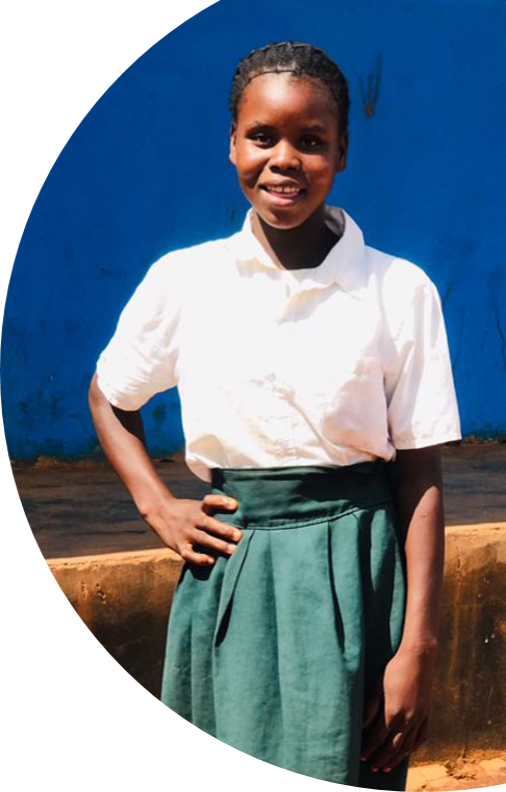
Meet Virginia
Virginia is 15 years old and lives in Mkanda village with her family, including five siblings. Education has been a struggle in her family, but Virginia is forging her own path. Her eldest sister married after leaving school in Grade 5, while another sister did not attend school and is now divorced with a child. The third and fourth siblings completed Grade 7 but due to finances, were not able to continue. Virginia, the fifth-born in her family, is currently in Grade 7, while her younger sibling is in Grade 5 at the same school. Even though finances are often tight, the family sustains itself through farming and was recently able to build a five-room house following a bountiful harvest. Virginia’s parents’ educational backgrounds differ – her mother left school after Grade 7. Her father completed his schooling but did not pursue higher education.
Virginia is part of a new generation that is breaking down barriers. She finds joy in learning and especially enjoys the rule-based approach of mathematics. During her free time, she works on her school lessons and relishes extracurricular activities that support women – like the ones that will be part of the Impact Girls project with Together Women Rise. She participates in GLOW Club, Life Skills Sessions, and a project to make menstrual pads. Through GLOW club, she has learned to be more assertive, understand the importance of advocating for herself, and to seek guidance from trusted sources like teachers. And her involvement in the menstrual pad-making project has helped her learn about menstrual hygiene and the importance of self-care during her period. Through it all, Virginia is focused on her studies and achieving her dreams. For her, there is no limit to what she can accomplish
Learn More
Country, Customs, & Cuisine
Proven Platter
Recipes
Source Materials
African Liberty – Challenges of Being Female in Kenya
UNICEF – Menstrual Health in Schools
Glossary
SRH: sexual reproductive health education
WASH: water, sanitation, and hygiene
MHM: menstrual health management
FGC/M: Female Genital Cutting/Mutilation
GBV: gender-based violence
GU: Flying Kites’ Girls United Program
G.I.R.L.S.: Flying Kite’s Guidance, Information, Resources, Leadership, and Skill-building curriculum
GLOW Clubs: Impact Network International’s Girls Leading Our World Clubs
GLOW Patrons: club leaders
VYA: very young adolescents, ages 10 – 14
